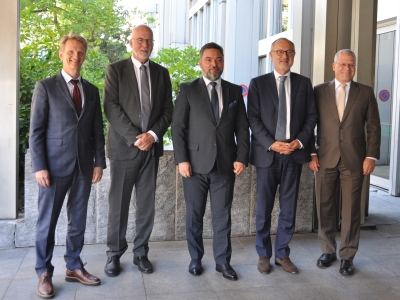About
The EFTA States signed a Free Trade Agreement with Bosnia and Herzegovina in Trondheim, Norway, on 24 June 2013. The Agreement entered into force on 1 January 2015.
Key facts
- Population
3,233,530
- GDP
$ 24,473.91 M
- Date of Signature of the Agreement
24.06.2013
- Date of Entry Into Force
01.01.2015
- Imports to EFTA States
EUR 208 M
- Exports from EFTA States
EUR 173 M
Information about agreement
Summary
The main focus of the EFTA-Bosnia and Herzegovina Free Trade Agreement is the liberalisation of trade in goods. EFTA and Bosnia and Herzegovina abolish all customs duties on industrial products. Additional agricultural agreements between the individual EFTA States and Bosnia and Herzegovina form an integral part of the instruments establishing the free trade area.
Content of the Free Trade Agreement
The Agreement consists of 9 Chapters, 54 articles and eight annexes. The Agreement covers the following main subjects:
- Trade in Goods
- Rules of Origin
- Trade Facilitation
- Sanitary and Phytosanitary Measures (SPS)
- Technical Barriers to Trade (TBT)
- Trade Remedies
- Trade in Services
- Investment/Establishment
- Protection of Intellectual Property (IPR)
- Government Procurement
- Trade and Sustainable Development
- Institutional Provisions
- Dispute Settlement
Trade in Goods
Industrial Goods and Fish and marine products
With the entry into force of the Agreement, EFTA abolishes all customs duties on imports of industrial products, including fish and other marine products, originating in Bosnia and Herzegovina. Bosnia and Herzegovina likewise abolishes all customs duties on industrial products originating in an EFTA State, apart from a few sensitive fish and other marine products (Annex III). For most of those products a gradual dismantling by Bosnia and Herzegovina is foreseen.
Agricultural products
The Agreement provides for tariff concessions on processed agricultural products (Annex II). Tariff concessions on basic agricultural products are covered by three bilateral agreements concluded between the individual EFTA States and Bosnia and Herzegovina.
Rules of Origin
The rules of origin and the methods of administrative cooperation between customs authorities are based on the Pan-Euro-Mediterranean origin rules. This allows for accumulation of materials originating in the EFTA States, Bosnia and Herzegovina and the other 'Pan-Euro-Med' member countries once the respective agreements are in place between the parties concerned.
Trade Facilitation
The Agreement contains detailed provisions on trade facilitation (Annex V).
Sanitary and Phytosanitary Measures (SPS)
The Agreement includes a provision on sanitary and phytosanitary in Chapter 2, which refers to WTO law.
Technical Barrier to Trade (TBT)
The Agreement includes a provision on technical regulations in Chapter 2, which refers to WTO law.
Trade Remedies
The Agreement includes provisions on state trading enterprises, subsidies, anti-dumping, anti-competitive practices affecting trade relations between the Parties, and disciplines on safeguard measures.
Trade in Services
Regarding trade in services, the Agreement refers to the WTO General Agreement on Trade in Services (GATS), containing in particular a “most favoured nation” provision and a review clause in accordance with GATS (Article 27).
Investment/Establishment
Investment is covered in Article 26, which refers to investment promotion, and it contains a review 5 year clause.
Protection of Intellectual Property Rights (IPR)
The provisions on protection of intellectual property rights (Article 25 and Annex VII) cover inter alia, patents, trademarks, copyrights and geographical indications. They are based on the WTO Agreement on Trade Related Aspects of Intellectual Property Rights (TRIPS) and provide for a high level of protection, taking into account the principles of most favoured nation treatment and of national treatment.
Government Procurement
The Agreement also includes a provision on public procurement aiming in particular at ensuring transparency and avoiding discrimination (Article 28).
Trade and Sustainable Development
The Parties recognise that economic development, social development and environmental protection are interdependent. In Chapter 6 they reaffirm their commitment to multilateral environmental and labour agreements and principles and undertake to uphold levels of protection while recognising the right of each Party to establish its own level of environmental and labour protection.
Institutional Provisions
In Chapter 7, the Agreement establishes a Joint Committee which supervises and administers the Agreement and oversees its further development. The Joint Committee may take decisions in cases provided for by the Agreement and make recommendations in other matters.
Dispute Settlement
Chapter 8 contains rules and procedures for the settlement of disputes arising under the Agreement between one or more of the EFTA States and Bosnia and Herzegovina.
Free Trade Agreement
| Table of Contents |
| EFTA-Bosnia and Herzegovina Free Trade Agreement |
|
Protocol amending the Free Trade Agreement between the EFTA States and Bosnia and Herzegovina |
Annexes and Record of Understanding
| Trade in Goods | Annex I | Excluded Products | ||
| Annex II | Processed Agricultural Products | |||
| Annex III | Fish and Other Marine Products | |||
| Annex IV | Industrial Products | |||
| Annex V | Trade Facilitation | |||
| Annex VI | Mandate for a Sub-Committee | |||
| Annex VII | Protection of Intellectual Property | |||
| Annex VIII | Transitional Arrangement | |||
| Annex IX | Concerning the Definition of the Concept of “Originating Products” and Methods of Administrative Cooperation | Appendix A | Alternative Applicable Rules of Origin |
PAPs notifications
Bilateral Agreements on Agriculture
| Iceland-Bosnia and Herzegovina | |
| Norway-Bosnia and Herzegovina | |
| Switzerland-Bosnia and Herzegovina | |
Statistics
For EFTA-Bosnia and Herzegovina trade statistics, see EFTA Trade Statistics Tool


